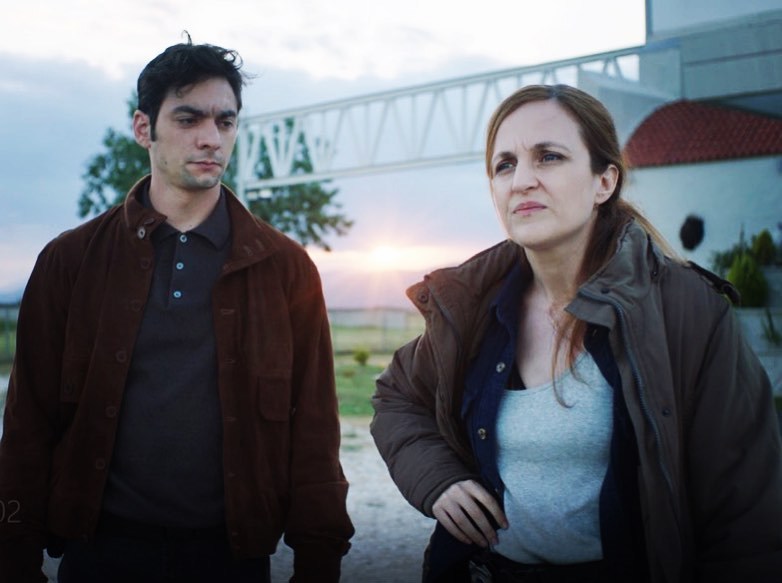
Based on the titular novel by Dimitris Simos, one of the most promising new voices in Greek crime fiction literature, Save Me conquered both the international audiences and the third place in the top 10 series aired on the local Netflix catalogue . Simos also wrote the screenplay of a story that has all the ingredients of a first-class thriller and is set in the small town of Komotini in the northernmost part of the country, which hosts a substantial Muslim minority. The director, Pierros Andrakakos, capitalizes on the multicultural locale while taking advantage of the opportunity to make a comment about the social inequalities and racism, some of the most prevalent issues that plague the local community during the past dew decades. The lead actors deliver memorable performances with Elena Mavridou, a young Greek thespian known chiefly through her work in the theater, shining in the role of the protagonist, detective Despoina Loukidi. Loukidi is living and working in Thessaloniki when her boss asks her to travel to Komotini in order to investigate the gruesome killing of a woman who is found in a municipal park with her eyes gouged out. Coincidentally, Komotini is also Loukidi’s hometown and it’s obvious that she is less than happy to return there. However an order is an order, so she travels there and joins the local police force. She teams up with detective Stratis Leris (Ektor Liatsos) and together they delve deep into a morbid case that claims the lives of more women who are all found with their eyes missing. The storyline’s boldness is a rarity for a Greek show and the macabre imagery shocked the local audience. Nevertheless, the plot is so engrossing that keeps the viewer engaged throughout the 8 episodes while the shattering climax leaves no loose ends. The whodunit element is always at play throughout the 8 episodes, and we find ourselves speculating with respect to the villain’s identity from early on in the series. - Apart from the police procedural aspect of the series, the screenwriter also focuses on the Pomanou family whose members play a vital role in terms of plot. There are three sisters, Nicol (Danae Skiadi), Alkistis (Lila Baklesi), and Rania (Ioanna Asimakopoulou) living in their family villa along with their elderly mother Areti (Evangelia Andreadaki).The relationships between them are strained for reasons revealed gradually by the screenwriter and they are put on the spotlight when Alkistis vanishes, allegedly by the killer. Detective Loukidi was a classmate of Nicol’s as well as her personal tormentor as she used to constantly bully her. We witness some of the harassment through some brief flashback sequences which are interjected to the main narrative and explain the tension that is palpable between the women each time they meet. Both Mavridou and Skiadi deliver impeccable performances and their chemistry is so volatile that deems each and every one of their interactions a minefield. Loukidi also maintains a complicated relationship with her father, Menelaos (Pavlos Orkopoulos), a retired district attorney, and even from the first episode their conversations suggest that there are several things that force them to say only what is necessary, always keeping a certain distance from one another. Mavridou’s performance has such potency that makes the character’s battle against her inner darkness so palpable that forces the viewer to feel a certain amount of empathy for her despite her tough attitude and apparent lack of emotions. Loukidi’s multi-faceted personal struggles constitute a sub-plot on their own and add another layer to the well-crafted screenplay by Simos. - - However, I feel that there are certain threads that remain underdeveloped, perhaps due to the limitations imposed by the TV formatting. For example, Loukidi’s gambling addiction which led to the fraught relationship shared with her father looks a promising narrative strand during the first episodes. However, the situation is temporarily put on hold when Loukidi steals a piece of jewelry from her father’s place to pay the loan sharks who had followed her to Komotini, never to resurface again during the final 3 episodes. - - Save Me takes full advantage of a well-known trope in crime fiction that is the small-town setting, a place always brimming with mystery. The local community and especially the members of its upper echelons hold dark secrets and cover crimes of the past that would destroy them if they were to become publicly known. After the first two episodes, we understand that nobody can be trusted in the small town of Komotini whether they are politicians, police authorities or its wealthiest citizens. Of course, in the novel Simos has more space to expand on the secondary characters, however the TV adaptation doesn’t neglect to shed a light on these motifs that add to the overall gloomy atmosphere of the show. Save Me is one of the best Greek television shows ever made and is worthy of international attention. It followed the breakthrough achieved by Sotiris Tsafoulias’s The Other Me, a production that reminded Greek people of the simple fact that crime fiction onscreen can be an experience to be relished.